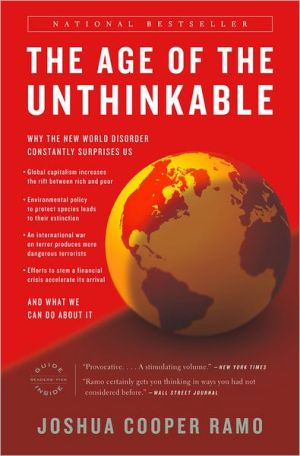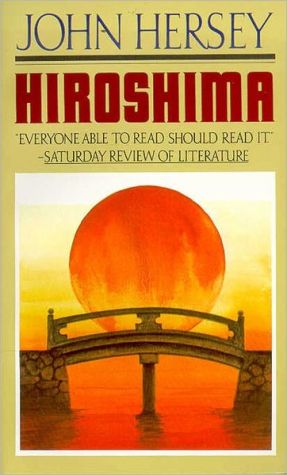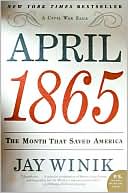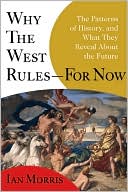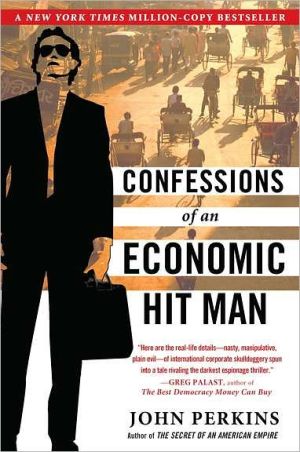The Age of the Unthinkable: Why the New World Disorder Constantly Surprises Us and What We Can Do About It
Today the very ideas that made America great imperil its future. Our plans go awry and policies fail. History's grandest war against terrorism creates more terrorists. Global capitalism, intended to improve lives, increases the gap between rich and poor. Decisions made to stem a financial crisis guarantee its worsening. Environmental strategies to protect species lead to their extinction.\ The traditional physics of power has been replaced by something radically different. In The Age of the...
Search in google:
For decades, American foreign policy has been based on the seductive belief that there exists a logical relationship between power of states and the physics of change. And yet today policies designed to make us safer instead make the world more perilous. History's grandest war against terrorism creates more terrorists. Global capitalism, intended to boost the quality of life of people around the world, increases the gap between rich and poor. Decisions taken to stem a financial crisis guarantee its arrival. Environmental techniques engineered to protect species lead to their extinction. Middle East peace plans produce less peace. Our world is not becoming more stable or flatter or easier to comprehend. And what we face isn't one single shift, like the end of World War Two or the collapse of the Soviet Union, so much as a revolutionary avalanche of ceaseless change.Now, drawing upon history, economics, complexity theory, human immunology, psychology and his own... The New York Times - Michiko Kakutani …[Ramo has] managed, in this stimulating volume, to make the reader seriously contemplate the alarming nature of a rapidly changing world—a world in which uncertainty and indeterminacy are givens, and avalanches, negative cascades and tectonic shifts are ever-present dangers.
Part 1 The Sandpile Effect1 The Nature of the Age 32 The Old Physics 203 The Sandpile 414 Avalanche Country 645 Budweiser 82Part 2 Deep Security6 Mashup 1037 The General and the Billionaire 1328 The Management Secrets of Hizb'allah 1699 The Limits of Persuasion 20010 Riding the Earthquake 22611 The Revolution and You 255Afterword to the Paperback Edition 265Acknowledgments 271Selected Sources 273Index 283Reading Group Guide 287
\ Michiko Kukatani[Ramo's] provocative new book...does a nimble job of showing how such theories shed light on the current political and economic climate while avoiding the worst pitfalls...[he] hasmanaged, in this stimulating volume, to make the reader seriously contemplate the alarming nature of a rapidly changing world.\ — New York Times\ \ \ \ \ Fareed ZakariaA great read, a wondrous and unexpected journey through a world that keeps getting more complicated. Joshua Cooper Ramo has a brilliant mind and a beautiful pen, and both are evident in this stimulating book.\ — author of The Post-American World\ \ \ Boston GlobeThought-provoking...highly recommended for anyone who runs a business, is involved in international relations, or cares about our collective future.\ \ \ \ \ Michiko Kakutani…[Ramo has] managed, in this stimulating volume, to make the reader seriously contemplate the alarming nature of a rapidly changing world—a world in which uncertainty and indeterminacy are givens, and avalanches, negative cascades and tectonic shifts are ever-present dangers.\ —The New York Times\ \ \ \ \ Publishers WeeklyRamo, a strategic adviser and former journalist, presents his proposals for rectifying foreign policy mistakes in a discussion that ranges from the public service work of Hezbollah to the German painter Anselm Kiefer. He offers a sustained aura of cool competence, less lecturer than dinner companion. Wrapping listeners in the cocoon of his hushed, keen rush of words, Ramo is an ideal conversationalist, even if the conversation, for these purposes, runs in only one direction. A Little, Brown hardcover (Reviews, Feb. 9). (Mar.)\ \ \ \ \ Library JournalYou can learn a lot by reading this book. China scholar Ramo (managing director, Kissinger Assoc.) explains his theory of "Deep Security" through a variety of wide-ranging analogies. While much of the focus is on peace in the Middle East and the role of Hizb'allah, we also learn about Gertrude Stein and cubism at the beginning of World War I, the development of video games from Donkey Kong to the Wii, the problem of maximum sustained yields for fish populations, the relationship between treating HIV and drug-resistant TB in South Africa, and the perils of running a business in Brazil while coping with hyperinflation. Again and again, Ramo reminds us of the power of individuals and the accomplishments that can be achieved by taking advantage of creativity and underutilized capacity. While (not surprisingly) he offers no great solutions, much can be learned from the examples he sets forth. Overall, a fascinating look at various aspects of today's complicated world and how interconnecting systems often come to bear in unexpected ways.\ —Susan Hurst\ \ \ \ \ \ Kirkus ReviewsThink things are weird, dangerous and frightening now? Just wait, counsels Kissinger Associates managing director and former Time editor Ramo (No Visible Horizon: Surviving the World's Most Dangerous Sport, 2003)-the mayhem is only beginning. The world is more complex than we can imagine, Ramo notes, and in a revolutionary era, the only thing to do is "think and act like a revolutionary." He adds that those who don't "have a particular name: victims." But what should be the focal point of our revolutionary thinking? Everything, says the author, starting with the fact that all that we know is wrong, such that our decisions seem to yield the wrong results. Given that, why listen to leaders, pundits and experts who get it wrong, and why follow the old course of making "minor adjustments to current policies, incremental change to institutions that are already collapsing, and an inevitable and frustrating expansion of failure"? After setting the tone, Ramo leaps into the shark-infested waters of geopolitics. He observes that we are incorrect to believe that the triumph of the West in the Cold War was inevitable-the Soviet Union fell to "the internal implosion of a society due to faults, twists, and kinks that even today we cannot map clearly"-and that we are misguided in our thinking that our current antiterrorism efforts are doing much more than producing more active terrorists. The old assumptions about the balance of power are off, since the old deterrents are gone; suicide bombers cannot be swayed in the same way cautious diplomats can. Ramo adds that focusing on "objects" such as Saddam Hussein at the expense of "the swirling, furious energy of the environment around those objects (clanrivalries, greed, corruption, a region aflame with fundamentalism)," you are bound to get mired down in places such as Iraq-a good reason, he remarks, to be smarter and less confrontational in dealing with other nations, particularly China. A smart essay in geopolitics and realpolitik that does not foresee a rosy future for conformists.\ \
